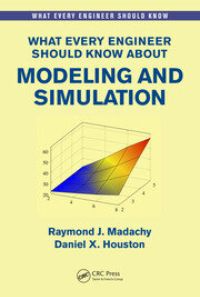What Every Engineer Should Know About Modeling and Simulation
Material type: TextLanguage: English Series: What Every Engineer Should Know ; V. 49Publication details: Boca Raton, FL : CRC Press, c2018Description: xix, 151 p. : illISBN:
TextLanguage: English Series: What Every Engineer Should Know ; V. 49Publication details: Boca Raton, FL : CRC Press, c2018Description: xix, 151 p. : illISBN: - 9781498753098
- 620.0011 MAD
| Item type | Current library | Shelving location | Call number | Copy number | Status | Date due | Barcode |
|---|---|---|---|---|---|---|---|
 Lending Collection
Lending Collection
|
Circulation Section | Circulation Section | 620.0011 MAD | 2023-2024 | Checked out | 10/05/2024 | 98623 |
Biography
Dr. Raymond Madachy is an Associate Professor in the Systems Engineering Department at the Naval Postgraduate School. Previously he was a Research Assistant Professor in the Industrial and Systems Department at the University of Southern California and a Principal in the USC Center for Systems and Software Engineering. He has 25 years of experience working in industry, academia and consulting in technical and management positions. His research interests include modeling and simulation of processes for architecting and engineering of complex systems; system cost modeling; systems and software measurement; process improvement and quality; integrating systems engineering and software engineering disciplines, and empirical-based research with process simulation. He has over 90 publications including the book Software Process Dynamics.
Dr. Dan Houston is a Sr. Project Leader at The Aerospace Corporation in Los Angeles, California, U.S.A. His work is applying quantitative methods, particularly using statistics and simulation, to software engineering. His industrial background includes software development, Six Sigma Black Belt, and software measurement. He received M.S. and Ph.D. degrees in Industrial Engineering at Arizona State University. His publications include work on statistical modeling and simulation of software development processes, software process improvement, and the management of software projects, particularly the aspects of risk, product quality, and economics.
SUMMARY: This practical book presents fundamental concepts and issues in computer modeling and simulation (M&S) in a simple and practical way for engineers, scientists, and managers who wish to apply simulation successfully to their real-world problems. It offers a concise approach to the coverage of generic (tool-independent) M&S concepts and enables engineering practitioners to easily learn, evaluate, and apply various available simulation concepts. Worked out examples are included to illustrate the concepts and an example modeling application is continued throughout the chapters to demonstrate the techniques. The book discusses modeling purposes, scoping a model, levels of modeling abstraction, the benefits and cost of including randomness, types of simulation, and statistical techniques. It also includes a chapter on modeling and simulation projects and how to conduct them for customer and engineer benefit and covers the stages of a modeling and simulation study, including process and system investigation, data collection, modeling scoping and production, model verification and validation, experimentation, and analysis of results.
